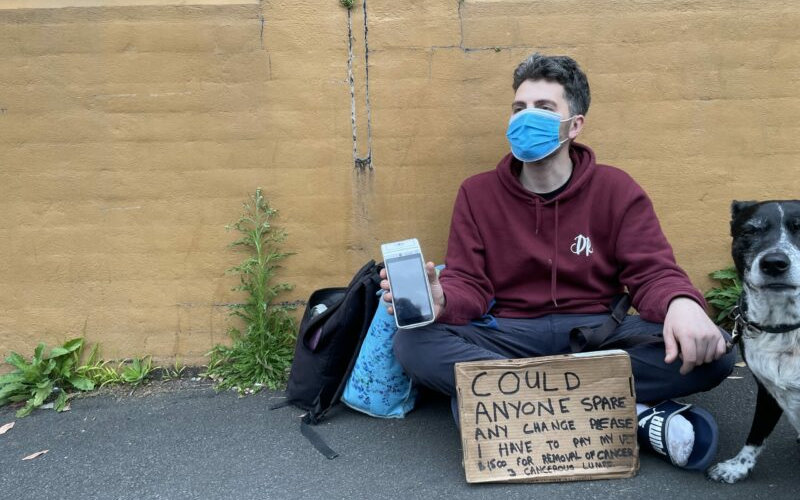Begging is tough enough at the best of times, but brutal now that the nation is on the brink of a cashless economy. Card machines may be an alternative for Australians who rely on spare change from strangers to stay afloat, writes James Fitzgerald Sice, but is this the best way to get ahead?
Dave Brown* has been begging on the streets of Sydney’s inner west for more than five years. However, it is only in the past year that he has started accepting card payments from passersby.
Dave is a 41-year-old recovering drug addict on a disability pension who lives in a housing commission unit in Glebe. Dave’s criminal record has meant he has found it difficult to find and keep a job, leaving him vulnerable to the steady decline of cash in Australia.
During the Covid-19 pandemic, this steady decline became a sudden drop-off. So when Dave found out that his 15-year-old dog Jedda needed operations to remove numerous cancerous lumps, he took a leap-of-faith into the digital economy.
Luckily this paid off. The $299 card machine Dave bought to improve his chances of getting a few bucks from passersby paid for itself within a few months. “I hardly got any money when I was relying on cash or spare change, it’s hard to get by you know … but with the card machine I’ve already made my money back,” said Brown.
Now any charitable stranger without spare change is able to give Dave money by choosing the amount and tapping their card.
“I used to steal things to get money … instead of standing out there (begging on the street) to get money for food or something. I would have just walked into a supermarket, filled up a bag and walked out like most people do in these poor suburbs… and people judge you and it’s ‘like how dare you’, at least I’m trying.”
Anyone can end up homeless, so many of us are living from week to week, but people are still happy to walk past thinking it’ll never happen to them. I wasn’t born like this, I didn’t think this would happen to me and yet it did.
Less cash, more expenses
With Australia’s use of cash set to fall below 2% in POS (point-of-sale) transactions by 2025, according to the 2022 Global Payments Report, those struggling with poverty will be forced to adapt to a cashless world.
However Dave’s story isn’t just representative of the debate between cash and card, but of growing poverty and inequality in Australia.
According to a report by the ABS, Australia’s inflation rate skyrocketed to 6.1% in June, a rate not seen in two decades. But wait! There’s more.
A 2022 report by the Australian Council of Social Services (ACOSS) found that the richest 10% of households in Australia has an “average of $6.1 million and almost half of all wealth (46%), while the lower 60% (with an average of $376,000) has just 17% of all wealth.”
The graph above shows how income inequality increased dramatically between 2003 and 2018 and began to drop slightly during the pandemic. However, the ACOSS report also details how “household wealth grew as much over the past three years as in the previous 15,” with two-thirds of the increase coming from house price inflation.

Source: Greg Jericho at the Guardian
While the Australian government’s income and wage support measures helped to prevent a temporary rise in income inequality and poverty during the pandemic, when they were removed the unemployment benefit rates plummeted to the lowest it had been in over 50 years with jobseeker rates being roughly $300 below the poverty line.
Below the line
So with growing inequality, a rising cost of living, and an increasingly cashless economy, how are Australians struggling with poverty supposed to get by?
Ruth Phillips, associate professor in social work and policy studies at Sydney University, believes that the convenience of card machines may leave some less technologically literate people behind.
“We inevitably will find that electronic transfer is the only way that people will be able to be given money by a passerby but that will also exclude a lot of people because they won’t be organised enough,” she said. “There are so many issues for people at the extreme end of poverty, and even though there are these different capacities now for people to accumulate cash … It’s uneven and inconsistent and not really promoted as a social policy.”
There’s still a huge number of people who are struggling below the poverty line. And when we take cash out of the economy, we do really prevent people who are in the most desperate end from actually managing from day to day.
Australia’s income support has gone through many changes over the years. From rights based, to Howard’s mutual obligation, to whatever the hell robodebt represented. Given that a cashless economy is getting closer, is the solution really for those who rely on spare change to develop their digital literacy and transition to card over cash?
If the extended payments given to people on JobKeeper showed us anything it is how the government can pivot quickly when in a crisis. The problem is they do not consider the current growing inequality, cost of living, and poverty rates a national crisis that warrants such a response.
*not his real name
James is studying a bachelor of Communication (Journalism) at the University of Technology Sydney. He is a producer at 2SER radio and contributor at UTS’s Central News.

